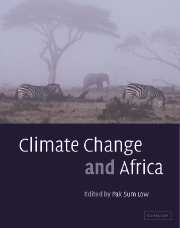Book contents
- Frontmatter
- Contents
- Notes on contributors
- Peer reviewers
- Editor's note
- Foreword
- Foreword
- Foreword
- Foreword
- Preface
- Preface
- Preface
- Preface
- List of abbreviations
- List of SI prefixes
- List of unit abbreviations
- List of chemical formulae
- Part I Science
- Part II Sustainable energy development, mitigation and policy
- 10 Biomass energy in sub-Saharan Africa
- 11 Natural resources: population growth and sustainable development in Africa
- 12 Sustainable energy development and the Clean Development Mechanism: African priorities
- 13 Opportunities for clean energy in the SADC under the UNFCCC: the case for the electricity and transport sectors
- 14 Regional approaches to global climate change policy in sub-Saharan Africa
- 15 Energy for development: solar home systems in Africa and global carbon emissions
- 16 Climate change in sub-Saharan Africa: assumptions, realities and future investments
- 17 Climate-friendly energy policies for Egypt's sustainable development
- Part III Vulnerability and adaptation
- Part IV Capacity-building
- Part V Lessons from the Montreal Protocol
- Index
16 - Climate change in sub-Saharan Africa: assumptions, realities and future investments
Published online by Cambridge University Press: 10 December 2009
- Frontmatter
- Contents
- Notes on contributors
- Peer reviewers
- Editor's note
- Foreword
- Foreword
- Foreword
- Foreword
- Preface
- Preface
- Preface
- Preface
- List of abbreviations
- List of SI prefixes
- List of unit abbreviations
- List of chemical formulae
- Part I Science
- Part II Sustainable energy development, mitigation and policy
- 10 Biomass energy in sub-Saharan Africa
- 11 Natural resources: population growth and sustainable development in Africa
- 12 Sustainable energy development and the Clean Development Mechanism: African priorities
- 13 Opportunities for clean energy in the SADC under the UNFCCC: the case for the electricity and transport sectors
- 14 Regional approaches to global climate change policy in sub-Saharan Africa
- 15 Energy for development: solar home systems in Africa and global carbon emissions
- 16 Climate change in sub-Saharan Africa: assumptions, realities and future investments
- 17 Climate-friendly energy policies for Egypt's sustainable development
- Part III Vulnerability and adaptation
- Part IV Capacity-building
- Part V Lessons from the Montreal Protocol
- Index
Summary
Keywords
Africa, global change research, scientific equity, climate change impacts.
Abstarct
Of all the regions in the World, sub-Saharan Africa is the least well equipped to respond to the issues associated with climate change. This paper discusses the significance of climate change to African nations and the related needs and opportunities. At the centre of the discussion are the important issues, often raised by African colleagues, of scientific equity and the urgent need for investment in African scientific infrastructure to help African scientists inform and advise African governments and decision makers on the likely impacts of climate change on their nations' economy and resource base.
In most African countries, funding for global change research is a low priority compared with more immediate and pressing societal issues. However, understanding the processes and predicting the impacts of climate change on African environment and economies necessitates a series of focused scientific initiatives within the region. These initiatives will require a combination of applied biological and social science and would benefit from being led by African scientists. Some initiatives are currently underway, supported in large part by the international community. African scientists need to be true partners in these scientific endeavours, from identifying the priority research questions, to designing and implementing the research and presenting the policy implications of the results. Now more than ever, support for African science and education must be part of the national and international development portfolios for the countries of the region.
- Type
- Chapter
- Information
- Climate Change and Africa , pp. 172 - 181Publisher: Cambridge University PressPrint publication year: 2005
- 1
- Cited by



